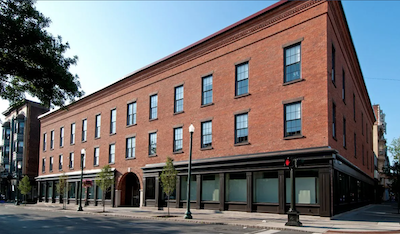By Bill Francis
On September 20, 2019, Professor Albert S. Paulson, Ph.D., our colleague, mentor, friend, and patriarch of the Lally School of Management, passed away.
Al, as he is known to his colleagues and friends, earned his undergraduate degree (B.S. in mathematics) from Kings College, and M.S. and Ph.D. degrees (both in statistics) from Virginia Polytechnic Institute. He joined the faculty of the University of Tennessee in 1967 as an assistant professor, where he was triple appointed in the Center for Business and Economic Research, Industrial Management, and Statistics. Subsequently, he joined the Lally Management Center in 1972, when it was part of DSES and housed in the Jonsson Engineering Center. This was followed by the complete separation and the relocation to the Pittsburgh Building, where the Lally School of Management currently resides.
Al can be considered the patriarch of the Lally School of Management. He was a major force in the growth of the Lally School of Management and Technology and held many different positions. He was the Chairman of the Operation Research and Statistics Area. He was also Professor of both Management and Decision Sciences and Engineering Systems. For a significant period of this time, he held an adjunct professor position at Albany Medical School, which speaks to his wide and deep knowledge on a variety of subjects. To cap this all off, in 1989 he was awarded the distinguished Frank and Lillian Gilbreth Chair in the Technologies of Management, which he still held at the time of his passing.
Al was an outstanding scholar. He published over 80 articles as well as several books and textbooks on statistical methods in risk theory and management as well as on innovation. Although the volume of his publication was extraordinary, it does not capture the essence of Al’s research achievement. As one of his mentees, Dr. Gina O’Connor, put it, he was very modest for someone of his brilliance. In his research, he addressed a vast array of consequential issues. He applied his mathematical genius not only to advance statistical theory but also to real-world problems. For instance, his work spanned environmental pollution’s impact on birthweight of children, the effect of water shortages in specific geographical regions on employment, risk arbitrage in futures markets, insurance pricing, influences of geographic concentration on economic activity, the effects of low doses of cigarette smoke on the likelihood of developing cancer, and how large mature firms build capability for breakthrough innovation, to name a few of the areas that his work spanned. His work was also influential in the field of risk management, especially as applied to the energy and finance sectors. He was a member of numerous professional associations, many in which he held leadership roles. Additionally, he was also very active in the consulting arena, where he did consulting work for a significant number of national and international firms and government agencies.
Although he was an outstanding researcher, he was an excellent teacher. His strength was his ability to relate to students and colleagues (many of which he mentored) on their level, combined with being able to explain the most difficult concepts in simple intuitive ways. His students loved him. He always found the time to meet with them, which often meant spending many hours, tutoring, and coaching them. His objective was to prepare them in the best way possible to be successful once they left RPI. Regarding the latter, he was very successful based on the numerous testaments by his former students. An example of the impact that he had on his students is an endowment of $250,000 in 2007 by Edmund H. Nicklin Jr. ’68 and Lorraine J. Vought-Nicklin ’74 to RPI to create the Albert S. Paulson Fellowship in Financial Management to fund graduate students enrolled in the Lally School of Management.
On a more personal level, despite his success professionally, his family came first. You could not be around Al for any period of time without him referring to his family. He had interests in a wide variety of topics, including baseball, polo, horseracing, local politics, real estate, and last but not least, he was a very big mushroom forager. As is clear, he was someone with many passions. Someone who was loved by his colleagues and his many students. Put simply — Al, we miss you.
